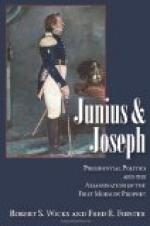Some natural comfort the weary man experienced from the sweet charm of the summer afternoon, from anticipation of the welcome and sympathy which would soon be his. He heard, but could not see, the Canandaigua water as it ran under its canopy of willows, over whose foliage the light wind passed in silver waves. On the height of the hill above the mill-dam he turned his horse into the yard of the Croom homestead. The stalwart deacon in overalls, his excitable, slender wife, her cap-strings flying, came forth, the one from the barn, the other from her bake-house.
It was not to either of these worthy souls that Finney intended first to confide the story of his glimpse of Susannah. It said much for the sterling truth of this man’s soul that, accustomed as he was to demand from himself and others public confession of those experiences most private to the individual soul, he had not lost delicacy of feeling or reverence for individual privacy in human relationships. He had not been at this house since the month after Susannah’s departure, when excitement and wrath still raged concerning her. He judged that in the hearts of the older members the wound had healed, leaving only the healthy scar that such sorrows leave in busy lives. He knew, too, that in Ephraim’s heart the blade of this grief had cut deeper.
The supper over, the full moon already gilding the last hour of the summer daylight, Ephraim donned his hat to take the solitary evening stroll to which he had become accustomed. He thought to leave the trio who were in complete accord of sentiment to talk longer over the persecution which Finney endured, but on the little brick path between the flower-beds the evangelist came up with him.
Ephraim was but half pleased. It was in this brief evening hour that he set his thoughts free, like children at playtime. Like other students forced to live in invalidish habits, he had established a rule of thought more strict than men of active callings need. At certain hours he would study his country’s social, political needs; at others he would help in his father’s farm management; at others he would study some exact science. But when the measured hours of his day were over, and before he lit his student’s lamp, for a while he turned his fancies loose, and they ran all too surely to play about Susannah’s charms, about the circumstances of her life. This was not his happiest hour. The eternal advantage of love was lost for the time in its present distress. Hateful thoughts were the results of this self-indulgence, yet he hated more anything that came as interruption. During these years the lover in him had not grown what the world calls wise.
For some minutes Finney, controlling the briskness of his ordinary pace, walked by Ephraim’s side and contented himself with the gracious scene, passing remarks upon weather and crops. Soon, for the value of time always pressed upon him, his business-like voice took a softened tone, and he began preaching a heart-felt sermon to his one listener.




